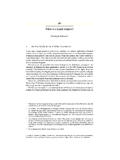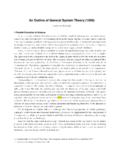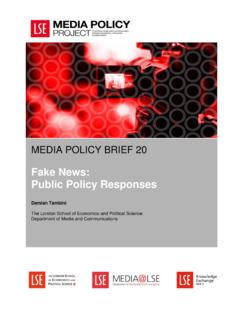Transcription of 128 Teleology and the concepts of causation - univie.ac.at
1 Ernst von Glasersfeld (1990) Teleology and the concepts of causation 1 Philosophica, 46 (2), 17 43, 1990. 128 teleology and the concepts of causation he term Teleology was coined by the philosopher Christian Wolff in his Latin treatise of 1728 and he defined it as indicating the part of natural philosophy that explains the ends, or purposes, of It has been used to describe a prominent feature of the theological views of Thomas Aquinas and the metaphysics of Aristotle. Some forty years ago, it was adopted by the founder of cybernetics to characterize a mechanism designed, among other things, to steer missiles to their target.
2 Since the instrumental purpose of artificial devices would seem to belong to a domain that is somewhat different from the metaphysical purposes of Nature and its components, it is reasonable to suspect that the term has shifted its meaning and become ambiguous. Where ambiguities remain hidden, all kinds of nonsense can be generated. In the present essay, I argue that the problem with Teleology goes back to one of the four explanatory principles that resulted from Aristotle s examination of what we now call causation . After a brief survey of the contemporary uneasiness about Teleology I present an exposition of Aristotle s classification of causes, suggesting that modern science has been somewhat cavalier in dismissing all but one of the four.
3 I suggest that an adequate analysis of the concept of efficient cause opens a way to showing that the notion of final cause, usually condemned as teleological , is in fact twofold and that one of its components does not at all infringe the accepted rules of science. In the last section, I explain the connection between this scientifically viable concept and the cyberneticians model of the negative feedback loop . To summarize my position, I hold that it was unfortunate that the ascendancy of a particularly narrow-minded school of psychology confounded the notion of goal-directed behavior with the independent metaphysical notion of Teleology .
4 The Objection to Teleology Among those who consider themselves hard-nosed scientists, the term Teleology is still quite often used to justify the unconditional rejection of an argument or explanation in question. The reason, as Ernest Nagel put it, is that the notion is equated with the belief that future events are active agents in their own realization, a belief which he characterizes as a species of superstition (1965; ). Sometimes a historical note is added. It explains that the misguided notion goes back to Aristotle, remained current throughout the Middle Ages, and was discarded once and for all by the first modern scientists in the Renaissance.
5 For science, as it developed in the Western world, it is unacceptable that something that lies in the future something that has not yet occurred should have the power to determine what is happening T Ernst von Glasersfeld (1990) Teleology and the concepts of causation 2 now. It would imply belief in an agency outside the field of our actual experience, and although such alien agencies were common-place in mythology and religion, the enterprise that came to be called science tries to manage without them. This is not at all unreasonable. Contemporary scientists (at least the more thoughtful among them) no longer believe that their efforts will be able to clear up all mysteries presented by the world in which we find ourselves living.
6 All the more, however, they believe that the tools they use, the concepts , hypotheses, and principles they formulate, must in some way be testable in the experiential world. These conceptual tools may originate as free inventions, but if they cannot be fitted into a more or less coherent network of demonstrable causes and effects they will not be considered scientific. The scientist does not believe in effects without causes; not even when they happen in the brain (Ashby, in Conant, 1981; ). Hence, an external agent with powers that override the constraints we run into in our experiential world, would have to be supernatural and therefore out of bounds for science.
7 The Hidden Ambiguity In spite of this unsympathetic attitude, the term Teleology has recently become more frequent in the discussions of scientists and even in the literature that is considered scientific. This, I would claim, is not due to an inconsistency in scientific thinking but rather to an inconsistency in the meaning attributed to the term. The inconsistency is not a random mutation but the surfacing of a distinction which, among others, was pushed out of sight by the particular view of causality inherent in Galilei s and Newton s mechanics. The spectacular success of mechanistic thinking led to the conviction that the only type of causation relevant to the scientific enterprise was the type Aristotle had isolated and described as efficient cause.
8 Richard Taylor summarized the historical development in Edwards Encyclopedia of Philosophy (1967): The concepts of material and formal causes are archaic and now have little significance outside aesthetics. Final causes have likewise been expurgated from physics. ( , ) To this influence of the history of physics on the Western way of thinking, one must add the thrust of the behaviorist doctrine in this century. Skinner s campaign succeeded to an extraordinary extent in excluding from the scientific domain not only human mind and meaning, but also all manifestations of intelligence in animals. Living organisms were to be squeezed into the Newtonian clockwork image of the world (in spite of the fact that theoretical physics had already moved beyond that conception).
9 Consequently, the powerful establishment of behaviorist psychology branded intention, purpose, and goal-directedness as dirty words, and did its best to expurgate them as relatives of the concept of final But, as Taylor remarked, this was also due to a widespread misconception of what a final cause or purpose is supposed to be ( ). Goal-directed behavior could be shown empirically, even within the rather limited range of experiments customary among behaviorists. But the professional behaviorists apparatus, such as the Skinner box, frequently relied on an automatic Ernst von Glasersfeld (1990) Teleology and the concepts of causation 3 mechanisms to record the experimental animal s responses.
10 This fostered a kind of tunnel vision, and as a result, the experimenter paid no attention to what the animal actually did. The apparatus keeps record of lever presses, but ignores how the animal moves to the lever in order to press it and that, at different times, it may be using a different paw. In a similar vein, Gerd Sommerhoff observed, once a rat has mastered a maze and found the place where the food is hidden, you can flood the maze, drop the rat at the entry, and it will swim to the food box. Thus there are things, beyond the chaining of elementary muscular responses, to guide the rat s behavior. He concluded: To list the responses of animals in different experimental situations, therefore, is to list the goals rather than the movements (Sommerhoff, 1974; ).


















